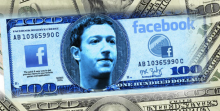Mashable
Facebook hit all the right numbers during its most recent earnings call last month.
Revenue was up. Profit was higher than any quarter in company history. And user totals were up in almost every category imaginable, including monthly actives, daily actives and mobile.
It's a safe bet that Facebook will see even higher revenue growth in the upcoming quarter — the holidays always produce great ad revenue — but that's not the only reason to be optimistic about Facebook's future revenue stream.
The social network has 1 million advertisers on its platform, a number first announced in June, and double the number of advertisers from a year before, said Dan Levy, Facebook's director of small businesses. One million advertisers is an impressive figure. Equally impressive is that Facebook has 25 million small businesses with active company pages, which means only 4% of companies that use Facebook to connect with customers are also using the site to advertise. That's a lot of potential advertising revenue sitting close at hand.
"I think that there is a goldmine waiting to be exhausted," Wedbush Securities analyst Michael Pachter, told Mashable in an email. "The 25 million businesses with active pages clearly understand that having a presence on Facebook has value to them, and it is only a matter of time before a large number of them experiment with advertising on Facebook."
Pachter said he believes that as many as half of the small businesses on Facebook will eventually advertise, which would generate more than $1.25 billion in ad revenue.
There are a handful of reasons why small and medium businesses aren't advertising more on Facebook, Levy said. For starters, many small businesses don't have a product ready for an advertising campaign. Others may have only one or two employees, so finding time or resources to advertise isn't always easy.
Facebook is trying to prepare itself for when these businesses are ready to advertise. With SMBs, that means a simpler advertising interface that eliminates a lot of the work needed to set up a campaign on Facebook. Instead of having to specify age groups, interests or education experience for its target audience, a company can now write their post, and simply attach a budget to it.
Facebook then handles the task of putting the ad in front of the right users, mostly fans of the brand page and their friends, according to Levy.
In the last year, 62% of new Facebook advertisers have come to the platform through these simpler interfaces, Levy said, confirming the need for a simpler ad process for small businesses.
Pachter said that Facebook will need to experiment with other kinds of ads, including coupons and location-based advertisements. A success-based advertising model, where businesses are only charged if their ad brings in customers or sales, could eliminate risk and encourage small businesses to take the plunge on Facebook, he added.
The good news for Facebook: It has 24 million small business already using its platform. This means convincing them that Facebook can help their business is already complete.
"If you travel around to conferences and you talk to folks that work with small businesses, they tell you the hardest thing in the world is to get a small business to pay attention to you," Levy said. "For us, our potential clients are already on Facebook. They already get it."
Now, it's only a matter of signing them up.






Post a Reply